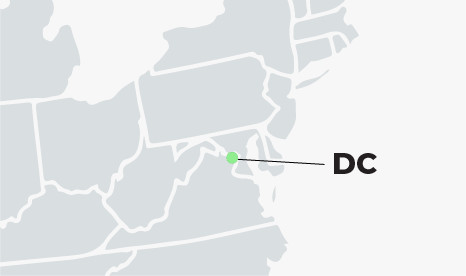| Subgrades | |
| Covered Speech: | A- |
| Anti-SLAPP Procedures: | C- |
| Subscores | |
| Covered Speech: | 90 out of 100 points |
| Anti-SLAPP Procedures: | 55 out of 100 points |
| Detailed Scoring on Anti-SLAPP Procedures | |
| Suspension of Court Proceedings Upon an Anti-SLAPP Motion: | 18 of 20 points |
| Burden of Proof on Plaintiff to Defeat an Anti-SLAPP Motion: | 12 of 12 points |
| Right to an Immediate Appeal: | 0 of 25 points |
| Award of Costs and Attorney Fees: | 25 of 40 points |
| Expansive Statutory Interpretation Instruction to Courts: | 0 of 3 points |
State Anti-SLAPP Statute
The District of Columbia’s anti-SLAPP statute[1] protects (1) statements made in connection with an issue under consideration or review by a legislative, executive, or judicial body, or any other official proceeding authorized by law, (2) statements made in a place open to the public or in a public forum in connection with an issue of public interest, and (3) expressions and expressive conduct that involves petitioning the government or communicating with the public in connection with an “issue of public interest.” (The statute expressly distinguishes between issues of public interest and issues of private or commercial interest; the statute protects speech about goods, products, or services in the marketplace, but not statements that are directed primarily towards protecting the speaker’s commercial interests.) Although discovery is stayed once an anti-SLAPP motion is filed, a court may nonetheless order that specified discovery may be conducted “when it appears likely that targeted discovery will enable the plaintiff to defeat the motion and that the discovery will not be unduly burdensome”; the court may condition this order upon a requirement that the plaintiff pay any expenses incurred by the defendant in responding to such discovery. In order to prevail against an anti-SLAPP motion, the respondent must establish that the claim is likely to succeed on the merits at trial. The statute does not provide for an interlocutory appeal of an order granting or denying an anti-SLAPP motion. The court may award costs and attorney fees to the prevailing movant on an anti-SLAPP motion; conversely, if the court finds the motion to be frivolous or solely intended to cause unnecessary delay, then it may award costs and attorney fees to the prevailing respondent.[2]
[1] D.C. Code § 16-5501 through § 16-5505.
[2] In Doe v. Burke, 133 A.3d 569, 578 (D.C. 2016), the court held that a successful SLAPP movant is entitled to “a presumptive award of reasonable attorney’s fees,” unless special circumstances would make that award unjust.












